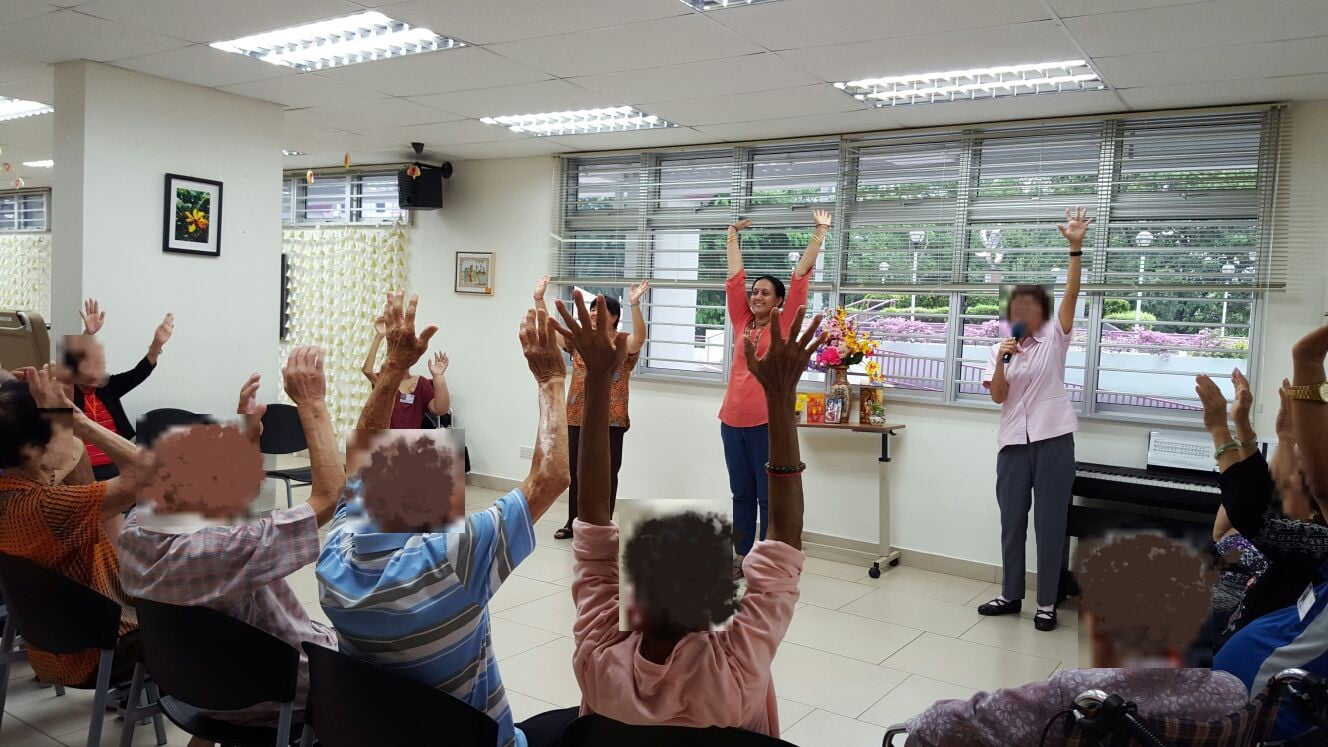Singapore Devotees Offer End-of-Life Spiritual Care at Local Hospice
By Lila Sundari Devi Dasi | Oct 22, 2023

Hospice patients and devotees raising their hands in “Haribol!” before pictures of Yashoda and Lord Krsna located on the center table.
Note: All patients’ names have been changed to protect their identities and the hospice’s name has been deliberately left out. Additionally, the patients’ faces in the photos have been blurred for privacy.
Many theistic persons and sometimes others turn to God for hope during desperate times. Devotees from Singapore provide spiritual care for patients for whom there is no other hope. At the instruction of His Holiness B.V.V. Narasimha Maharaj, ISKCON devotee Padma Locan Das has launched a hospice outreach at the Gita Reading Society, the local ISKCON congregation. Padma Locan Das, his wife, Renuka Devi Dasi, Vraja Lila Devi Dasi, Karuna Devi Dasi, Subhanana Devi Dasi, and Sewa Kund Devi Dasi are part of a team that routinely visits and cares for patients at a day hospice in Singapore.
A hospice is a place that provides care for terminally ill patients. A day hospice is a place that offers activities to engage the patients so they do not find life meaningless. Games and other engaging activities usually do this. What better way can there be to make life meaningful than Krsna Consciousness? Here is where the devotees come in!
Devotees have found creative ways to infuse Krsna Consciousness into the different games and activities used to engage the patients. For example, they play musical chairs with the patients. The music they play for the game includes songs such as George Harrison’s “My Sweet Lord” or Boy George’s “Hare Krishna.”
- Patients showing the ghee lamps to the Yashoda-Damodar picture during a Damodar program.
- Center staff showing the ghee lamps to the Yashoda-Damodar picture during a Damodar program.
- Kirtan session with patients.
- Padma Locan Prabhu conducts an activity with patients during the Chinese Mid Autumn festival. The center has been decorated with lanterns for the festival.
Padma Locan also offers Yoga and Mindfulness meditation with the patients. He asks the patients to close their eyes and relax, then slowly describes a beautiful blue colored boy with curly black hair. The blue boy holds a flute in his hand and sports a peacock feather on his head. Sounds familiar? The boy is there to help them out. The participants are invited to meditate on feeding their blue friend food and then eat the remnants themselves.
Another activity teaches patients how to make flower garlands. After these garlands are made, they are collected and later offered to their Lordships.
Which program is complete without kirtan and prasadam? Karuna sings, and Vraja Lila plays the mridanga as patients follow along. According to Padma Locan, some patients are so intense as they sing the Holy Names. Delicious prasadam is prepared by Renuka Devi Dasi, Karuna Devi Dasi, Subhanana Devi Dasi, and Sewa Kund Devi Dasi and served to the patients. Patients either honor them independently or are fed by the devotees.
Hospice outreach is undoubtedly a service for the resilient. “Not everyone can handle this,” Padma Locan said, “Some devotees enthusiastically took up this service at first but dropped out after what they saw here.” Despite that, there are still many inspiriting stories:
When Hang Kiat was about to leave his body, his family members held a vigil. They invited the devotees to join in. The devotees sang kirtan, and Padma Locan had the opportunity to slowly whisper the Holy Name in Hang Kiat’s ear as he passed on.
Mithun George, another patient, had slipped into a coma. The devotees sang kirtan for George, although he was from a Catholic family. While still in a coma, George shouted, “Rama! Rama! Rama!” He then fell silent, leaving his body a few hours later. His family members later told the devotees that he used to be a Hindu before he converted. He was very interested in the Ramayana. The family members were so grateful to the devotees and happy that George had chanted Lord Rama’s name before he left.
All this has created a positive impact at the hospice. “The staff really like the devotees,” Padma Locan noted, “They want us to come. We can see that.” Further, the dedicated service of the devotees has been rewarded with a Certificate of Appreciation by the hospice for five years of service.
Some patients at the hospice are quite hopeful, Padma Locan says. They hold on to the futile belief that they will survive for long periods. They see their peers and comrades graduate – a euphemism used among hospice circles for death. However, they somehow do not believe the same will happen to them. Here, we see an extreme example of what Bhishmadev said to King Yudhishthira – that the strangest thing in life is that people around us die, yet we think we will live on forever. It’s not just a phenomenon at the hospice but a stark reminder to all of us.
Two quotes that especially inspire the Singapore devotees include:
“Life cannot be prolonged by heart transplant. You cannot increase the duration of life. One can perhaps give some relief to disease…”
- Srila Prabhupada Letter, June 4, 1976
and
“We are teaching every man how he can prepare himself so that after leaving this body he can go directly… back to home, back to Godhead… Tyaktva deham punar janma naiti mam eti sorjuna” (BG 4.9).
- Srila Prabhupada Lecture, Edinburgh, July 16, 1972



















